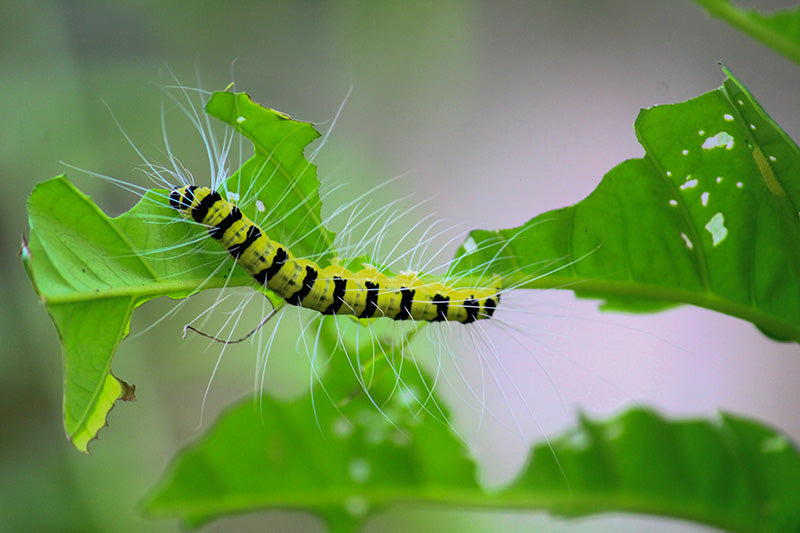Gardens are part of the natural world. That’s part of their beauty and their wonder; they connect us to nature and to deep time. While this is a great thing and part of the reason we garden, it also brings a few headaches in the form of unwanted bugs, insects, and various pests in the garden. Dealing with pests and bugs is part of gardening, so let’s take a look at a few of the strategies you can employ to better cope with the creepy-crawlies in your gardening space.
Let’s start by defining a pest. Just as the only definition of a weed is “a plant that grows where you don’t want it” the only definition of a pest is “a small creature living where you don’t want it.” This is a bit subjective; every gardener has their own list of pests and their own limits on what they will tolerate. Some folks desire that their garden be totally free of unwanted creatures; others embrace the madness of nature and try to create an environment that works for all of the lifeforms involved. There’s no wrong answer, just your own preferences and the steps that meet your goals.

With that said, let’s address some easy ways to keep unwanted creatures out of your garden. The best way to do this is with a passive approach via good garden design, setting up your space in such a way that attracts and supports the organisms you want and repels the ones you don’t. Proper mulching can keep many pests away, particularly from flower or vegetable gardens. Removing the dark places slugs like to hide can help eliminate them, just as removing standing water can help cut down on mosquitos and other damp-loving bugs (Well maintained bird baths, rain barrels, and other water sources don’t count; they should stay bug-free with proper care). In a larger garden or even on a large(ish) patio, crop rotation can keep the bug population from building up year to year. By planting different plants or flowers in different locations each season, you’ll keep the pests confused and stop them from taking over. As always, good ventilation is a must–a regular breeze keeps moisture levels down and discourages many bugs from settling in and laying eggs.
The next step involves actively deterring bugs and other unwanted pests. There are a number of ways to do this, but an easy one involves planting things that attract “good” bugs and repel “bad” ones. This is a simple thing to implement in most gardens, and there’s further good news: most of these plants are desirable additions to any garden space. Basil is a must-have culinary herb, but it also works to attract beneficial pollinators–many of which prey on garden pests too. Marigolds and nasturtiums are popular additions, easy to grow, and actively repel many unwanted bugs from garden vegetable plants. Mint is another garden favorite that keeps away many bugs, from hornworms to cockroaches. By planting these things throughout your space, either in the ground or a raised bed or in containers, you’ll be warding the unwanted bugs away.
Finally, we should talk about chemical deterrents for garden pests. We’re not quick to recommend insecticides in home gardens, as they tend to cause as many problems as they solve, but there are some times approaches that work better than others. Diatomaceous earth is a good compromise. Composed of tiny, sharp fragments of fossilized algae (pretty neat in its own right!) diatomaceous earth is food safe but kills small insects by causing tiny abrasions that eventually dehydrate them. It’s a good ongoing compromise before resorting to a chemical pesticide. Likewise neem oil, derived from the neem plant, is an organic insect repellent available at many garden stores–particularly those that specialize in organic gardening. Diluted with water and applied with a spray bottle, it works well at keeping pests away.
We hope we’ve given you ideas for how to deal with pests in your garden. If you have any tricks, tips, or information that we’ve missed, please get in touch and let us know. Drop a message in the comments below or catch us on social media. Who knows? Your idea may just inspire a followup article!

Leave a comment